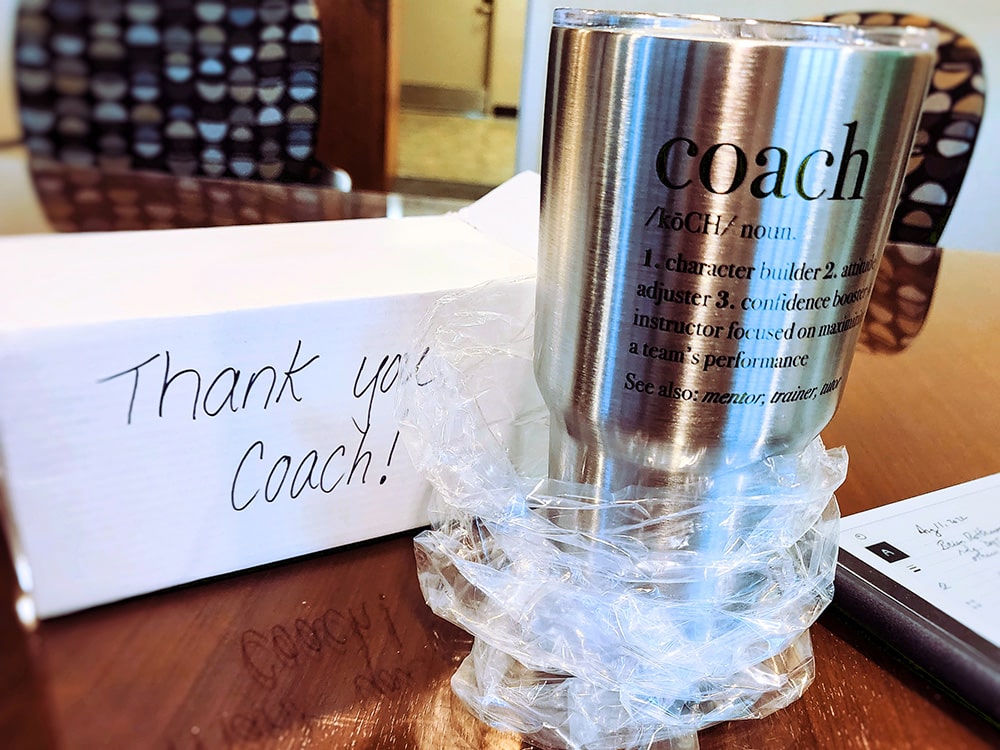
Yeti courtesy of fantastic client…!
As a seasoned (beats “old”) executive and leadership coach, I’ve had the privilege and honor of working with myriad top-tier leaders and executives for over 20 years.
And let me tell you, it’s been a wild, crazy, and usually fun ride.
Also sometimes hectic, disturbed, frustrating and leaving me mumbling what the hell…? But that’s a different article.
One thing I’ve learned is that even the most successful, high-achieving individuals among us can benefit from a little guidance and support. Some more than others (oops, did I say that out loud?).
But why?
Well, for starters, it ain’t what you don’t know that gets you into trouble. It’s what you know that just ain’t so.
I first heard that phrase when used by a board chair describing why he supported his CEO in this coaching endeavor. I know now that Mark Twain may have said it earlier, but I also know that this board chair said it better.
It’s the things we’re absolutely certain about, but are actually dead wrong, that can really get in the way.
We’ve all been there: convinced that our way is the best (or only) way, that our gut instinct always serves us well, or that our decades of experience have given us untoward wisdom as a superpower.
But the truth is, there’s always room for improvement, and a fresh perspective can be just what we need to avoid an unnecessary misstep.
Like in tennis, when execs make blunders they really could have avoided, I call them unforced errors. Those hurt. And they suck.
Another Matrix-like reality is that you don’t always know with certainty if the success you’re having is because of you or in spite of you. Are you really bending the spoon? That’ll bake your noodle…
I can get carried away with movie references, sorry.
I mean, think about it – have you ever looked around at your team and wondered, “Are they just humoring me, or do they actually think my ideas are straight-up genius?”
Okay, maybe that’s just me.
But how often do we attribute our success to our own decision-making, instincts, acumen or brilliance, when it just might be due to a combination of factors, like luck, circumstance, or even the herculean efforts of others?
That maybe all of our suggestions are praised because of our business card, not our brilliance?
Though initially a tough pill to swallow, acknowledging to the world that we don’t have all the answers can be incredibly liberating.
And then there’s the age-old adage, the favorite of my colleague and friend Kevin Ross: “Be the reason, not an excuse.”
Every day we make this choice – we can be the reason our folks succeed, or we can be the excuse they give when they fail. And every day, you have to choose.
It sometimes feels like a subtle distinction; it’s not.
When we’re willing to own our mistakes, take responsibility for our actions, and actively seek to improve, we become the reason our teams thrive.
Sounds eerily like accountability. We are the exemplar for other positive behaviors.
But when we’re too proud to ask for help, too afraid to admit our weaknesses, or just too damned stubborn to change a course, we become the excuse they use to justify their own shortcomings.
We become the exemplar for their poor behavior and/or performance.
So, what does all of this have to do with executive coaching?
Well, everything.
As a coach, my job is helping you separate the things that ain’t so from the things that really matter – to you and your team.
I’m here to help you realize when your success is due to your own efforts versus just dumb luck.
And by the way, there’s nothing at all wrong with a little luck here and there. Go play golf. Just be cognizant of the difference, so you can map out future efforts.
Most importantly, I’m here to support you in becoming someone’s reason – not their excuse. The example that others use daily, and the person they point a finger to when others ask how something should work.
It’s not about being perfect; it’s about being willing to learn, grow, and adapt.
And let’s be real, who among us hasn’t benefited from a little bit of guidance and support at some point? Even coaches have coaches. I do.
If you’re intrigued by the idea of executive coaching, or if you’re simply tired of being your own excuse, I’d love to discuss.
Reach out if I can help in any way.
And remember that Grace and Accountability can coexist…

